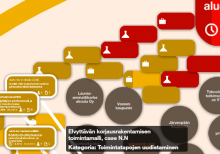 Cognitive Maps Ltd. has released its first whitelabeled “corporate” version of the Hitlantis interface. The integration was made for Tekes to help visualize the projects the government agency is operating in.
Cognitive Maps Ltd. has released its first whitelabeled “corporate” version of the Hitlantis interface. The integration was made for Tekes to help visualize the projects the government agency is operating in.
The current Tekes project visualization was aided somewhat hand-on by the Cognitive Maps folks, but when the company releases their SaaS infrastructure later this year, they say the client will have a light and easy admin tool to control the inputs and outputs of the visualization. On top of that, they also have documented and fully functioning API’s that can visualize many types of categorized data.
The goal of the visualization is not merely to have a pretty way to display data. The company is creating a solution to allow anyone to both show the long-tail of data they offer, as well as provide information about the quality of information as well. In the Tekes solution, for example, the standard way to show their projects would be to list data, maybe broken down to pages. The Cognative Maps visualization instead puts everything in front of you, making it easy to dive deep to figure out what you’re looking for, but at the same time getting a clearer sense of the big picture.
Timo Poijärvi, CEO, and Co-Founder of Cognitive Maps LTD tells us that they see many areas where this type of visualization technology could be used. “We have received lots of licensing enquiries from service areas like public sector’s project management, innovation management, traditional portals and content services. Basically all of these would benefit a lot from using our visualization platform because the platform generates wider and better content consumption offering users much better understanding about the quantity and quality the service is offering.”
Even though according to Poijärvi it seems that there is a lot of demand for this kind of service, one has to wonder how far this innovation would scale. There is an ever growing market for add-ons to content management systems out there and Cognitive Maps would surely be able to benefit from that, but there’s still a ways to go before demand for this type of service could be easily monetized. What do you think? Let us know in the comments.





